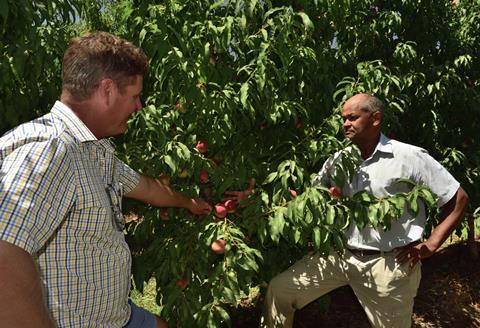Partners in Agri Land Solutions is a relatively new initiative steering land reform in South Africa, and is making waves by creating new opportunities for people all over South Africa
Since 2014, Partners in Agri Land Solutions (PALS) has been proactively solving South Africa’s land reform challenges in a practical, merit-based and honest manner that supports economic growth, job creation, food security, custodianship and social harmony.
Pals is a private sector initiative in which black and white farmers cooperate with all spheres of government and communities. It started in the fruit region of Witzenberg in the Western Cape but has now expanded to the Free State and Mpumalanga and with listed Pals projects throughout South Africa.

“The simpler things are, the more ingenious they are,” says Gerrrit van Vuuren, Pals Strategic Advisor. “In essence, the framework of Pals projects adheres to this principle. Imagine a tripod. Because it’s standing on three legs, it will always stand sturdy, irrespective of the surface.”
He says the Pals framework is the same. In a farming context, there is the established commercial farmer, the new-generation farmer, and the third leg is the farming company. “It is the mentor, the learner and the business structure,” he explains.
Pals also works closely with the deciduous fruit industry body Hortgro and is supported by the Jobs Fund, a job creation initiative by the National Treasury. In 2022, with Nedbank coming on board, sustainable inclusive agricultural development expanded to all regions of South Africa.
The framework addresses key critical success factors for a sustainable enterprise, including access to land, capital to acquire land and inputs, markets to sell produce to, acquisition of inputs and services, dispute resolution mechanisms, an exit strategy and a comprehensive supportive environment. “It facilitates, enables, coordinates and monitors all aspects pertaining to training, mentorship and the sustainability of new enterprises, making a Pals centre a “one-stop-shop,” says van Vuuren.
Due to many unsuccessful land reform initiatives in South Africa since 1994, Pals represents a radical departure from these models and is based on sound business and legal principles, mentorship and training of emerging farmers. “The unique Pals framework ensures that issues of sustainability, mistrust, unequal relationships and succession planning are addressed,” notes van Vuuren.
In the words of agricultural industry leader Pieter du Toit of the Dutoit Group, a South African Pals board member and one of the founders: “We realised that to make progress we needed established growers, new era producers, agricultural industry organisations and the government to work together.”
Pals Regional Centres, led by their respective boards, develop strategies with defined targets and required resources. Regional programmes are developed in line with the Pals framework while remaining independent entities.
“Pals, as a non-profit company, does not only function as a legal entity, but also a living entity through the members of the organisation. It has its own energy and sense of direction, calling to manifest something in the world, creative potential and collective intelligence,” says van Vuuren.
According to national spokesperson Lennox Plaatjies, Pals is stepping out of the “waiting for others” mode, into “creating our desired future every day”. Members take pro-active steps to improve local conditions and enable economic, social and environmental sustainability in collaboration with the relevant stakeholders. “This means Pals is solution-driven to create sustainable enterprises led by dedicated farmers and value chain participants.”
Pals has now established momentum, continuously producing new success stories. “The table is set,” says van Vuuren. “Pals is ready to talk to more investment partners who can help to accelerate the process.”



